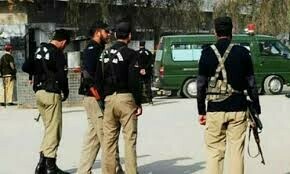LAHORE, Feb 1: The project of life-saving interferon injection has come back on track after three years and is ready to take off as the inquiry into alleged mis-utilisation of funds has been completed by the Federal Investigation Agency.
The FIA has exonerated Dr Riazuddin Sheikh among others, who had pioneered this project.
The stakeholders have agreed that those behind the inquiry must be identified and penalised because the delay in making the interferon injection has led to many deaths, stoppage of technology development and loss of funds in terms of foreign exchange for import of injections in finished form. A case in this regard has already been referred to the National Accountability Bureau.
Former Punjab governor Shahid Hamid, who is chairman of the Interferon Projects and Interferon Policy Guidance committees, at a workshop on “Present and future trends of Interferon for treatment of hepatitis” on Friday said the project was now on its launching pad and the committees were going to hold a meeting with the federal finance secretary to get nod for the release of Rs500 million lying in different bank accounts of the Centre of Excellence in Molecular Biology (CEMB), which were frozen when the inquiry was constituted.
“There is no reason left to hold back the funds,” he said. He said Dr Riazuddin Sheikh would overall supervise the project and added that Project Director Dr Ahmad Usman Zafar would be reinstated. “The Punjab University vice chancellor has agreed to reinstate the PD,” he added.
Stating that the inquiry wasted three years, Mr Hamid said it would take another three years to develop proteins for mass production of interferon injections. He said the ministry of science and technology would fix responsibility on officials for making complaints and delaying the life-saving project.
Nuclear scientist Dr Samar Mubarakmand said the Public Accounts Committee had asked him to think of developing facilities that should have Current Good Manufacturing Practice (CGMP) certification. He said the CGMP regulations, enforced by the US Food and Drug Administration, were essential for quality assurance.
Dr Mubarakmand said the CEMB had earned Rs500 million from its different projects and the amount was kept in different bank accounts. “As soon as this money will be released, it will be sufficient to establish CGMP facility,” he said.
He said millions of people in Pakistan needed interferon injections. He hoped that the scientists’ team led by Dr Sheikh and Dr Zafar would complete the trials within six months and become instrumental in making interferon injections. It would be available in the market at a rate ranging from Rs15 to Rs100 against the current price of Rs1,500 per injection.
“The CEMB should develop raw material and engage pharmaceutical companies to produce interferon injections,” he suggested.
Interferon Projects and Interferon Policy Guidance Committees’ member Prof Dr Javed Akram said the inquiry constituted against Dr Sheikh was a ploy to stop the marketing of indigenous interferon invention. He said the CEMB had developed 150,000 injections some three years ago and had qualified trial on healthy volunteers.
“These injections’ use was blocked when they were supposed to be used for hepatitis patients recruited from Multan,” he regretted. The injections were later expired, he said.
He said the interferon injection case could be the biggest public-interest litigation in the Supreme Court as 50 to 60 people were dying because of hepatitis every day in the country.
When asked, Dr Riazuddin revealed that neither he nor PD Dr Zafar had so far been given appointment orders. “There are many problems within the Punjab University and administrative matters are not on track,” he said.
He also said Dr Zafar (a BPS-19 officer) had come from the ministry of science and technology but was not being given salary for the last one and-a-half year.
Answering a question, he said, PU Vice-Chancellor Prof Dr Mujahid Kamran wanted to induct Prof Dr Shahida Hasnain, a retired faculty member in the university, as project director at the CEMB. Prof Hasnain, however, was inducted in CEMB’s Board of Governors on the recommendation of the VC.
Interestingly, he said, Prof Hasnain informed a BoG meeting that she had developed interferon in 2007 but could not explain further development in preceding years.
Meanwhile, Centre of Applied Molecular Biology (CAMB) Director-General Dr Muhammad Iqbal, on behalf of the university administration, stood up and said the FIA report submitted to the PAC had not been shared with the university.














































Dear visitor, the comments section is undergoing an overhaul and will return soon.